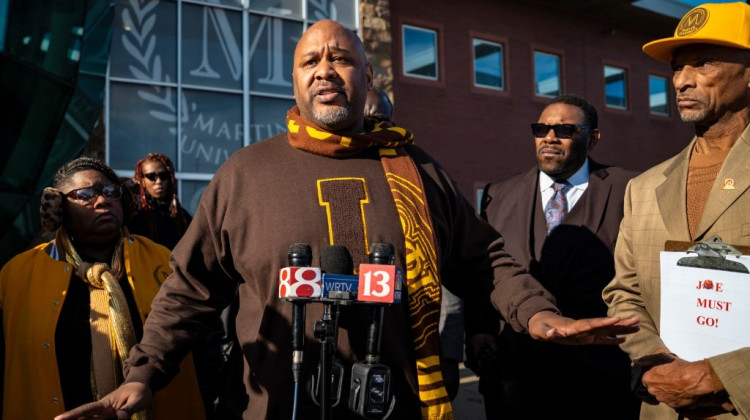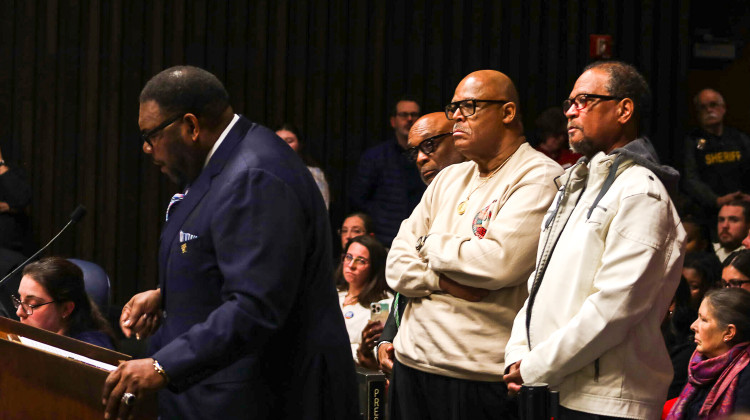
About 14,000 preschoolers had diagnosed disabilities, down more than 11% — or about 1,800 students — from last year, according to an annual count of students with disabilities approved Wednesday by the Indiana State Board of Education.
(FILE PHOTO: Rachel Morello/StateImpact)The number of Indiana students enrolled in programs for disabilities declined this school year — the first dip in at least four years and the latest sign of the disruption caused by the pandemic. The drop was especially pronounced among preschool children with special needs.
About 14,000 preschoolers had diagnosed disabilities, down more than 11% — or about 1,800 students — from last year, according to an annual count of students with disabilities approved Wednesday by the Indiana State Board of Education.
There was also a dip in the number of students ages 5 to 22 years old who had disabilities, but it was far less significant. This school year, about 169,000 elementary and high school students received special education services, which is nearly 1,400 fewer students than last year. That drop is less than 1%.
The Indiana Department of Education attributed the decline primarily to lower overall enrollment this school year. About 15,000 fewer K-12 students attended public schools this year than last year. About 4,000 fewer students attended public preschool — a nearly 20% drop.
“Some families have also expressed apprehension at bringing their preschool-aged children in for evaluations during the pandemic,” Holly Lawson, a spokeswoman for the Indiana Department of Education, wrote in an email. “We expect to see ... the special education pupil count numbers stabilize again over the coming year.”
Even a small drop is unusual. The number of students diagnosed with disabilities has increased each year since at least 2016.
Young children who are not identified as needing special services could be missing out on therapies that would help them catch up to peers — or missing preschool altogether. Although Indiana does not have universal preschool, children ages 3 to 5 who have disabilities have access to early education and therapies under the federal Individuals with Disabilities Education Act.
Kim Dodson of the Arc of Indiana said the decline reinforced concerns that students with disabilities have not gotten needed services during the pandemic.
“A lot of parents probably did not seek out help because they kept their children at home and just tried to get by and survive rather than leaning on the school at this time,” Dodson said.
Other families faced barriers getting access to virtual services, she said.
It is hard to assess whether children who are not in school are getting what they need because Indiana does not track the services homeschooled students receive, said Tammy Hurm, the assistant director for a special education program in Southern Indiana and a member of the Indiana Council of Administrators of Special Education.
Parents who withdrew their children or did not enroll them due to the pandemic could still get them support from outside programs or therapies, she said.
“I am most concerned about the unknown,” Hurm said. “Where are the students? Are they safe? Are they getting what they need?”
Angela McKinney, a consultant with the Indiana IEP Resource Center, said the educational challenges students have faced this year could also make it harder for schools to diagnose disabilities. For example, it could be difficult to distinguish between students who are struggling because they do not do well in virtual classes and students who have learning disabilities.
“I think a lot of the schools are saying, ‘Let's try layering on some more support for everyone to try and make up for the craziness,’” she said, “as opposed to jumping straight to ‘Oh, let's evaluate for a specific learning disability.’”
Contact WFYI education reporter Dylan Peers McCoy at dmccoy@wfyi.org. Follow on Twitter: @dylanpmccoy.
 DONATE
DONATE






 View More Articles
View More Articles



 Support WFYI. We can't do it without you.
Support WFYI. We can't do it without you.